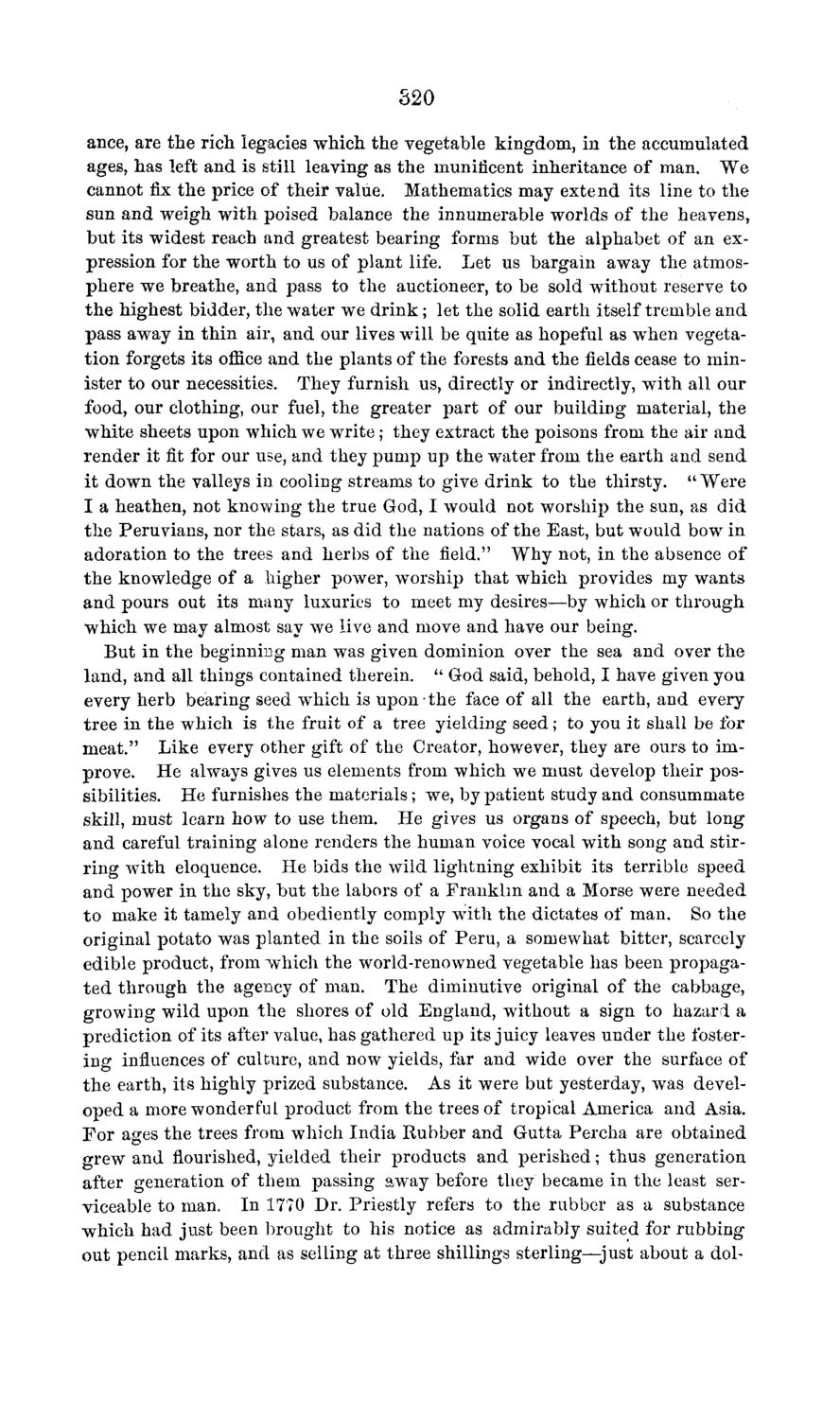| |
| |
Caption: Board of Trustees Minutes - 1869
This is a reduced-resolution page image for fast online browsing.

EXTRACTED TEXT FROM PAGE:
320 ance, are the rich legacies which the vegetable kingdom, in the accumulated ages, has left and is still leaving as the munificent inheritance of man. W e cannot fix the price of their value. Mathematics may extend its line to the sun and weigh with poised balance the innumerable worlds of the heavens, but its widest reach and greatest bearing forms but the alphabet of an expression for the worth to us of plant life. Let us bargain away the atmosphere we breathe, and pass to the auctioneer, to be sold without reserve to t h e highest bidder, the water we d r i n k ; let the solid earth itself tremble and pass away in thin air, and our lives will be quite as hopeful as when vegetation forgets its office and the plants of the forests and the fields cease to minister to our necessities. They furnish us, directly or indirectly, with all our food, our clothing, our fuel, the greater part of our building material, the white sheets upon which we w r i t e ; they extract the poisons from the air and render it fit for our use, and they pump up the water from the earth and send it down the valleys in cooling streams to give drink to the thirsty. a W e r e I a heathen, not knowing the true God, I would not worship the sun, as did the Peruvians, nor the stars, as did the nations of the East, but would bow in adoration to the trees and herbs of the field." Why not, in the absence of the knowledge of a higher power, worship that which provides my wants and pours out its many luxuries to meet my desires—by which or through which we may almost say we live and move and have our being. But in the beginning man was given dominion over the sea and over t h e land, and all things contained therein. " God said, behold, I have given you every herb bearing seed which is upon the face of all the earth, and every tree in the which is the fruit of a tree yielding seed; to you it shall be for meat." Like every other gift of the Creator, however, they are ours to improve. He always gives us elements from which we must develop their possibilities. He furnishes the materials; we, by patient study and consummate skill, must learn how to use them. He gives us organs of speech, but long and careful training alone renders the human voice vocal with song and stirring with eloquence. He bids the wild lightning exhibit its terrible speed and power in the sky, but the labors of a Franklin and a Morse were needed to make it tamely and obediently comply with the dictates of man. So t h e original potato was planted in the soils of Peru, a somewhat bitter, scarcely edible product, from which the world-renowned vegetable has been propagat e d through the agency of man. The diminutive original of the cabbage, growing wild upon the shores of old England, without a sign to hazard a prediction of its after value, has gathered up its juicy leaves under the fostering influences of culture, and now yields, far and wide over the surface of the earth, its highly prized substance. As it were but yesterday, was developed a more wonderful product from the trees of tropical America and Asia. F o r ages the trees from which India Rubber and Gutta Percha are obtained grew and flourished, yielded their products and perished; thus generation after generation of them passing away before they became in the least serviceable to man. In 1770 Dr. Priestly refers to the rubber as a substance which had just been brought to his notice as admirably suited for rubbing out pencil marks, and as selling at three shillings sterling—just about a dol-
| |